PEP小学六年级英语Unit-unit31重点短语句型总结
新人教版(PEP)小学英语六年级上册各单元知
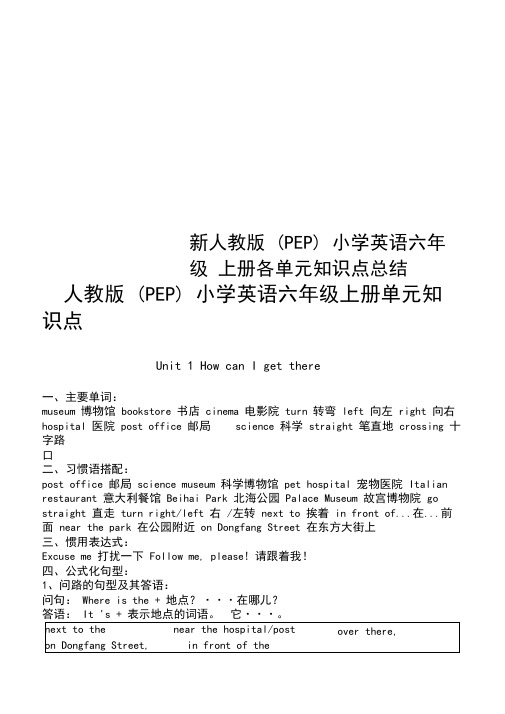
新人教版 (PEP) 小学英语六年级上册各单元知识点总结人教版(PEP) 小学英语六年级上册单元知识点Unit 1 How can I get there一、主要单词:museum 博物馆bookstore 书店cinema 电影院turn 转弯left 向左right 向右hospital 医院post office 邮局science 科学straight 笔直地crossing 十字路口二、习惯语搭配:post office 邮局science museum 科学博物馆pet hospital 宠物医院Italian restaurant 意大利餐馆Beihai Park 北海公园Palace Museum 故宫博物院go straight 直走turn right/left 右/左转next to 挨着in front of...在...前面near the park 在公园附近on Dongfang Street 在东方大街上三、惯用表达式:Excuse me 打扰一下Follow me, please! 请跟着我!四、公式化句型:1、问路的句型及其答语:问句:Where is the + 地点?···在哪儿?答语:It 's + 表示地点的词语。
它···。
2、询问怎么到某地的句型及其答语:问句:How can +主语+ get (to)+地点?···怎么到···?同义句型:Can you tell me the way to + 地点?Where is + 地点?Which is the way to + 地点?答语:Turn +方向+表示地点的介词短语。
···转。
at the cinema at the corner near the post office...五、例句:Where is the cinema, please? 请问电影院在哪里?It ' s next to the hospital. 它与医院相邻。
pep六年级上册英语笔记
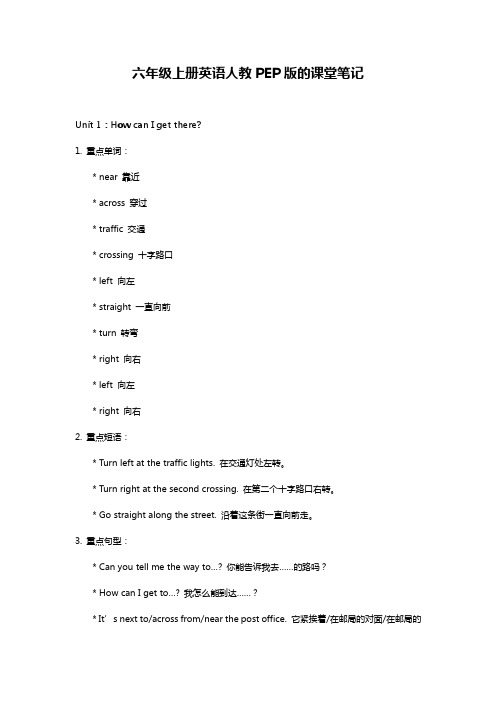
六年级上册英语人教PEP版的课堂笔记Unit 1:How can I get there?1. 重点单词:* near 靠近* across 穿过* traffic 交通* crossing 十字路口* left 向左* straight 一直向前* turn 转弯* right 向右* left 向左* right 向右2. 重点短语:* Turn left at the traffic lights. 在交通灯处左转。
* Turn right at the second crossing. 在第二个十字路口右转。
* Go straight along the street. 沿着这条街一直向前走。
3. 重点句型:* Can you tell me the way to…? 你能告诉我去……的路吗?* How can I get to…? 我怎么能到达……?* It’s next to/across from/near the post office. 它紧挨着/在邮局的对面/在邮局的附近。
4. 语法知识:* 用“Can you tell me the way to…?”和“How can I get to…?”询问道路和交通方式。
* 用“next to/across from/near”等介词表达位置关系。
5. 功能话题:问路和指路,描述位置关系。
6. 文化知识:了解不同国家的交通规则和交通标志。
Unit 2:Where is the science museum?1. 重点单词:* science museum 科学博物馆* library 图书馆* hospital 医院* cinema 电影院* post office 邮局2. 重点短语:* Excuse me. 对不起。
* Thank you very much/a lot. 非常感谢你。
3. 重点句型:- Excuse me, where is the science museum? 对不起,请问科学博物馆在哪里?- It’s next to/across from/near the post office. 它紧挨着/在邮局的对面/在邮局的附近。
人版小学pep英语[三年级起点]六年级(上册)知识点归纳
![人版小学pep英语[三年级起点]六年级(上册)知识点归纳](https://img.taocdn.com/s3/m/d93d57ae195f312b3169a59f.png)
Unit1 How can I get there? 我怎样到达这里?重点单词:where哪里 how 怎样 can能够 near近的 ask问 tell 告诉 far远的science科学 hospital 医院 museum 博物馆 postoffice 邮局library图书馆 bookstore 书店 usually通常 sometimes有时候 often 经常know知道 near旁边 next to旁边(比near更近) crossing 十字路口turn left 向左转 turn right 向右转 go straight直走in front of在…的前面 behind在...的后面重点句子:1.How do you go to school? 你是怎样去上学的?2.where is the restaurant? 餐馆在哪里?ually I go to school on foot.我通常走路去上学。
4.Sometimes I go by bike.有时候我骑自行车去。
、5.问路之前;出于礼貌;我们要说“Excuse me.”与后面的句子要用标点符号隔开。
6.Look at the traffic lights; remember the trafficrules.看着交通灯;记住交通规则。
7.Stop at a red light.Wait at a yellow light.Go at agreen light.红灯停。
黄灯等一等。
绿灯行。
8.Red means stop; yellow means wait; green means go.红色的意思是停止;黄色的意思是等待;绿色的意思是通行。
9.How can I get to the park? 我该怎样到达公园呢?10.You can go by the No.15 bus.你可以坐15路公交车去。
重点知识:1.坐某种交通工具用by;例如:by bike; by train。
最新人教版PEP小学英语六年级上册复习要点
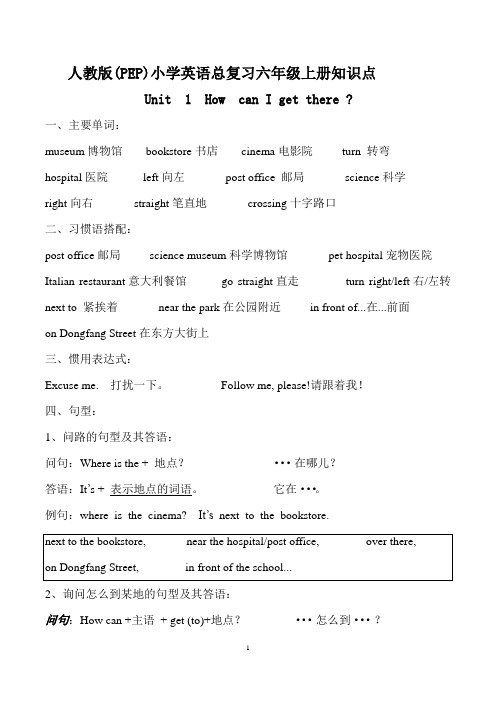
人教版(PEP)小学英语总复习六年级上册知识点Unit 1 How can I get there ?一、主要单词:museum博物馆bookstore书店cinema电影院turn 转弯hospital医院left向左post office 邮局science科学right向右straight笔直地crossing十字路口二、习惯语搭配:post office邮局science museum科学博物馆pet hospital宠物医院Italian restaurant意大利餐馆go straight直走turn right/left右/左转next to 紧挨着near the park在公园附近in front of...在...前面on Dongfang Street在东方大街上三、惯用表达式:Excuse me. 打扰一下。
Follow me, please!请跟着我!四、句型:1、问路的句型及其答语:问句:Where is the + 地点?···在哪儿?答语:It’s + 表示地点的词语。
它在···。
例句:where is the cinema? It’s next to the bookstore.next to the bookstore, near the hospital/post office, over there,on Dongfang Street, in front of the school...2、询问怎么到某地的句型及其答语:问句:How can +主语+ get (to)+地点?···怎么到···?例句:How can I get to ZhongShan park? How can I get there?同义句型:Can you tell me the way to +地点?Where is + 地点?Which is the way to +地点?答语:Turn +方向(left/right)+表示地点的介词短语。
新版PEP小学英语六年级上册1-6单元知识点总结
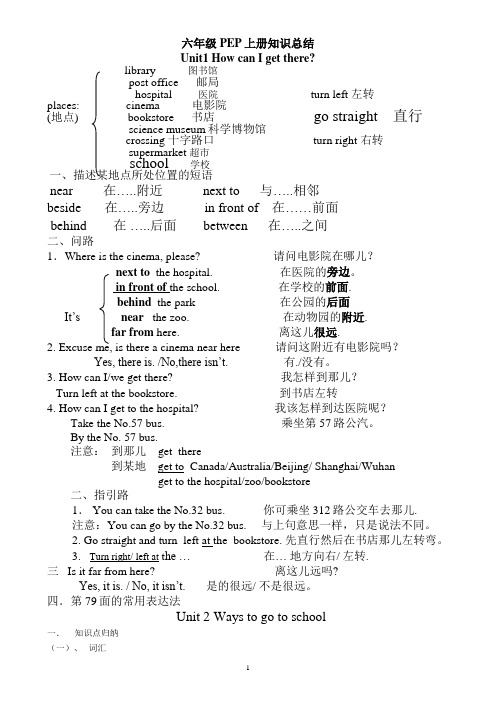
六年级PEP上册知识总结Unit1 How can I get there?library 图书馆post office 邮局hospital 医院turn left 左转places: cinema 电影院(地点) bookstore 书店go straight 直行science museum科学博物馆crossing 十字路口 turn right 右转supermarket 超市school 学校一、描述某地点所处位置的短语near 在…..附近 next to 与…..相邻beside 在…..旁边 in front of 在……前面behind 在…..后面 between 在…..之间二、问路1.Where is the cinema, please? 请问电影院在哪儿?next to the hospital. 在医院的旁边。
in front of the school. 在学校的前面.behind the park 在公园的后面It’s near the zoo. 在动物园的附近.far from here. 离这儿很远.2. Excuse me, is there a cinema near here 请问这附近有电影院吗?Yes, there is. /No,there isn’t. 有./没有。
3. How can I/we get there? 我怎样到那儿?Turn left at the bookstore. 到书店左转4. How can I get to the hospital? 我该怎样到达医院呢?Take the No.57 bus. 乘坐第57路公汽。
By the No. 57 bus.注意:到那儿 get there到某地 get to Canada/Australia/Beijing/ Shanghai/Wuhanget to the hospital/zoo/bookstore二、指引路1. You can take the No.32 bus. 你可乘坐312路公交车去那儿.注意:You can go by the No.32 bus. 与上句意思一样,只是说法不同。
人教版(PEP)小学六年级上册英语知识点【三、四、五单元】

人教版(PEP)小学六年级上册英语知识点【三、四、五单元】Unit3Whatareyougoingtodo?一、重点短语:thismorning今天上午thisafternoon今天下午thisevening今天晚上nextweek下周tomorrow明天tonight今晚postcard明信片comicbook漫画书newspaper报纸二、重点句型:1.Whatareyougoingtodoontheweekend?你周末打算做什么?2.I’mgoingtovisit mygrandparentsthisweekend?这个周末我打算去看望我的外祖父母。
3.Whereareyougoingthisafternoon?你今天下午打算去哪里?4.I’mgoingtothebookstore.我打算去书店。
5.Whatareyougoingtobuy?你打算去买什么?6.I’mgoingtobuyacomicbook.我打算去买一本漫画书。
三、重点语法:1、Whatareyougoingtodo你想做什么询问他人在未来的打算。
begoingto后面要跟动词的原形。
注意begoingtobe意思是"打算成为什么,干什么职业。
"注意一下句子的区别,找出正确回答。
WhatareyougoingtodothisafternoonWhatareyougoingtobuyWhatare yougoingtobeWhenareyougoingWhereareyougoingHowareyougoingWh oareyougoingwith2、thisevening和tonight的区别:thisevening指的是今天晚上睡觉以前的时间,一般指晚上十二点以前。
而tonight指的是今晚,一般是指一整晚的时间,通宵。
3、部分疑问代词的意义与用法:(1)What什么。
用来问是什么,做什么,叫什么,什么样等等。
(完整)新版PEP小学英语三到六年级各单元重点单词与句型汇总,推荐文档

【单词】文具ruler(尺) pencil (铅笔) eraser(橡皮) crayon(蜡笔) bag (书包)pen (钢笔) pencil box ( 铅笔盒) book (书)【句子】1、 Hello, I’m Wu Yifan. 你好,我是吴一凡。
2、Hi, I’m Sarah. 你好,我是萨拉3、I have a ruler / an eraser.我有一把尺子/一块橡皮。
4、-What’s your name ? 你叫什么名字?-My name’s John. 我叫约翰。
5、-Goodbye! 再见!-Bye, Miss White. 再见,怀特小姐。
【单词】颜色red(红色的)green(绿色的) yellow(黄色的)blue(蓝色的) black(黑色的) brown (棕色的) white (白色的) orange (橙色的)【句子】1、--Mr Jones, this is Miss Green.琼斯先生,这是格林小姐。
-Good morning, Miss Green.早上好,格林小姐。
2、I see red.我看见红色。
3、Good afternoon, Wu Yifan.下午好,吴一凡。
4、-Nice to meet you.见到你很高兴。
-Nice to meet you, too.见到你也很高兴。
5、 Colour it brown!把它涂成棕色吧!【单词】身体部位face( 脸) ear (耳朵) eye (眼睛) nose(鼻子) mouth (嘴) arm (胳膊)hand(手) head (头) body (身体) leg (腿) foot (脚)【句子】1、--How are you?你好吗?--I’m fine, thank you.我很好,谢谢你。
--Let’s go to school! 我们一起上学吧!2、 Look at me !看我!3、Very well, thanks.很好,谢谢。
人教版PEP小学英语六年级上册重点句型及语法知识汇总

人教版PEP小学英语六年级上册重点句型及语法知识汇总Unit 1 How can I get there?重点单词XXX。
post office邮局,XXX。
XXX。
XXX。
crossing十字路口。
turn left左转。
turn right右转。
gostraight直走。
map地图。
compass指南针。
GPS全球定位系统。
stars星星。
XXX意大利餐厅。
getto到达。
重点句型1.---Where is the restaurant?餐厅在哪里?It’s next to the park on Dong fang Street.它在东方路,在公园附近。
2.---How can we get there?我们怎么去哪里?XXX left XXX.书店左转,然后病院右转。
3.He now has GPS.他现在有GPS。
4.What an interesting film!何等风趣的片子!方位词复:XXX紧挨着,near在。
邻近,XXX在。
背面,XXX在。
旁边,in front of在。
前面。
Unit 2 Ways to go to school重点单词on foot走路。
by bike骑车。
by bus乘公交。
by train乘火车。
XXX乘地铁。
by ship搭船。
by XXX乘飞机。
slow down 慢下来。
XXX交通灯。
traffic rules交通划定规矩。
go/come to school上学。
by sled坐雪橇。
byferry坐轮渡。
pay n to留意。
traffic lights交通灯。
and wait at a red light红灯停等一等。
slow downand。
at a yellow light黄灯减速并停下。
Go XXX。
重点句型1.---How do you come to school?你怎么上学?----Usually。
I come on foot.通常我走路来的。
Unit3+where+did+you+go+知识点梳理-2024学年人教PEP版英语六年级下册
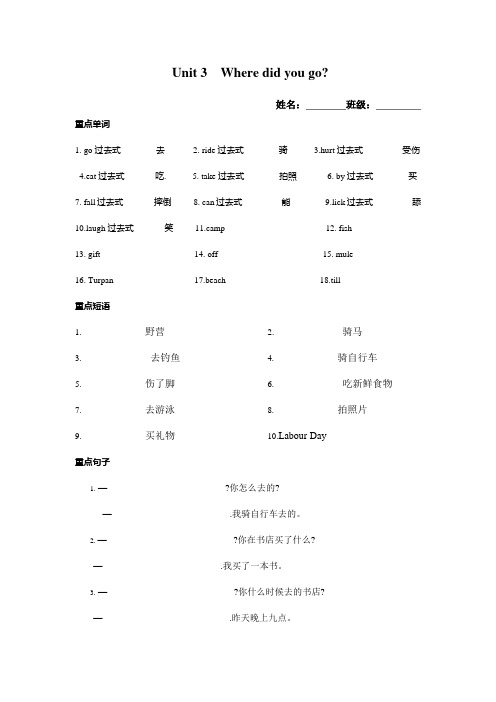
Unit 3Where did you go?姓名:________班级:_________重点单词1. go过去式_______ 去2. ride过去式_______ 骑3.hurt过去式________ 受伤4.eat过去式_______吃.5. take过去式_______ 拍照6. by过去式_______ 买7. fall过去式_______摔倒8. can过去式_______ 能9.lick过去式_______ 舔ugh过去式_______笑11.camp_________ 12. fish___________13. gift _________ 14. off_________ 15. mule_________16. Turpan _________ 17.beach _________ 18.till _________重点短语1. ______________野营2. ______________骑马3.______________去钓鱼4. ______________骑自行车5. ______________伤了脚6. ______________吃新鲜食物7. ______________去游泳8. ______________拍照片9. ______________买礼物bour Day______________重点句子1.—___________________________?你怎么去的?—___________________________.我骑自行车去的。
2. —_____________________________?你在书店买了什么?—___________________________.我买了一本书。
3.—_____________________________?你什么时候去的书店?—_____________________________.昨天晚上九点。
新人教版(PEP)小学英语六年级下册各单元知识点总结
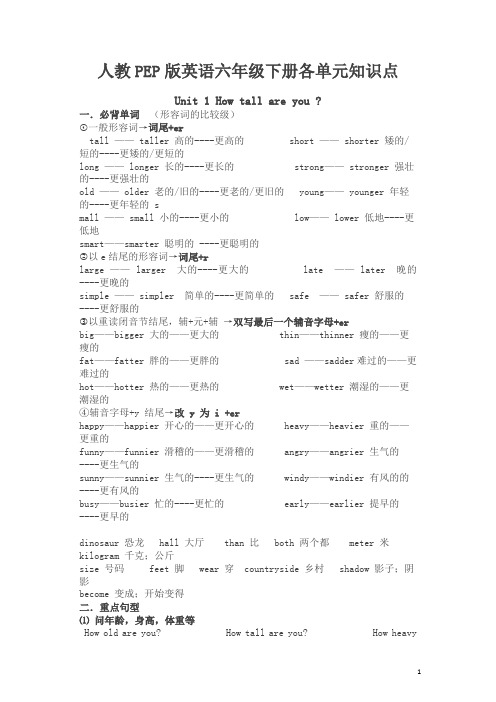
人教PEP版英语六年级下册各单元知识点Unit 1 How tall are you ?一.必背单词(形容词的比较级)①一般形容词→词尾+ertall —— taller 高的----更高的 short —— shorter 矮的/短的----更矮的/更短的long —— longer 长的----更长的 strong—— stronger 强壮的----更强壮的old —— older 老的/旧的----更老的/更旧的 young—— younger 年轻的----更年轻的 small —— small 小的----更小的 low—— lower 低地----更低地smart——smarter 聪明的 ----更聪明的②以e结尾的形容词→词尾+rlarge —— larger 大的----更大的 late —— later 晚的----更晚的simple —— simpler 简单的----更简单的 safe —— safer 舒服的----更舒服的③以重读闭音节结尾,辅+元+辅→双写最后一个辅音字母+erbig——bigger 大的——更大的 thin——thinner 瘦的——更瘦的fat——fatter 胖的——更胖的 sad ——sadder难过的——更难过的hot——hotter 热的——更热的 wet——wetter 潮湿的——更潮湿的④辅音字母+y 结尾→改 y 为 i +erhappy——happier 开心的——更开心的 heavy——heavier 重的——更重的funny——funnier 滑稽的——更滑稽的 angry——angrier 生气的----更生气的sunny——sunnier 生气的----更生气的 windy——windier 有风的的----更有风的busy——busier 忙的----更忙的 early——earlier 提早的----更早的dinosaur 恐龙 hall 大厅 than 比 both 两个都 meter 米kilogram 千克;公斤size 号码 feet 脚 wear 穿 countryside 乡村 shadow 影子;阴影become 变成;开始变得二.重点句型⑴ 问年龄,身高,体重等How old are you? How tall are you? How heavyare you?--- I’m _______ (years old). --- I’m ______metres tall. ---- I’m ______ kilograms .⑵ 问物品的情况:① How large is your room? 你的房间有多大?It’s ______ m (square meters.) 有___平方米。
Unit3Myweekendplan(知识清单)人教PEP版英语六年级上册

Unit 3 My weekend单元知识点总结一、重点短语1.morning【释义】n.上午2.afternoon【释义】n.下午3.evening【释义】n.晚上4.tonight【释义】adv.在今晚5.tomorrow【释义】adv.在明天6.next week【释义】下周7.visit my grandparents【释义】拜访我祖父母8.go to the supermarket【释义】去超市9.see a film【释义】看电影10.take a trip【释义】去旅行11.dictionary【释义】n.词典12 ic book【释义】连环画册13.word book【释义】单词书14.postcard【释义】n.明信片二.重点句式1.【课文应用】What are you going to do tomorrow?你明天打算做什么?I'm going to have an art lesson.我打算上美术课。
【句型结构】问句:What are you going to do(+表示将来时间的词语)?答语:I'm/We're going to+动词原形(+其他).【重点解析】am/is/are going to表示“计划;打算”,是一般将来时的一种标志。
am/is/are going to常与动词原形搭配使用。
表示将来时间的词语可以是next week(下周)、the day after tomorrow(后天)等。
【生活实例】寒假前,Chen Jie和Liu Qiang在教室里谈论假期的安排。
我们一起来看看他们都有什么打算:Chen Jie:What are you going to do this winter holiday?你这个寒假打算做什么?Liu Qiang:I'm going to visit Beijing with my mother.What about you?我打算和我妈妈游览北京。
人教版(PEP)小学英语六年级上册全册知识点总结
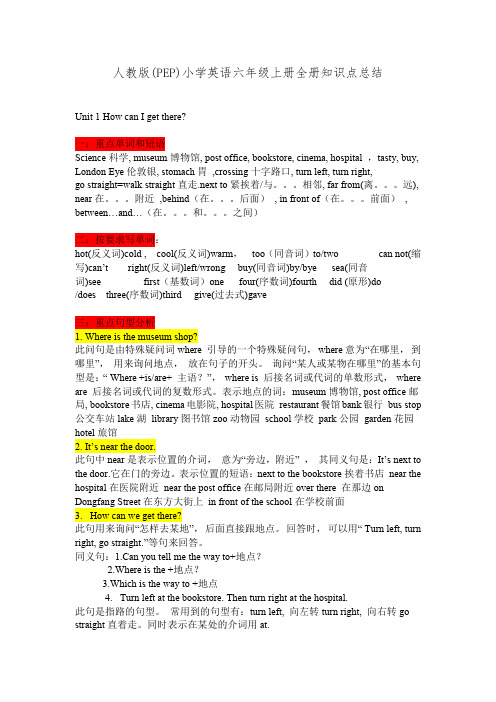
人教版(PEP)小学英语六年级上册全册知识点总结Unit 1 How can I get there?一:重点单词和短语Science科学, museum博物馆, post office, bookstore, cinema, hospital ,tasty, buy, London Eye伦敦银, stomach胃,crossing十字路口, turn left, turn right,go straight=walk straight直走.next to紧挨着/与。
相邻, far from(离。
远), near在。
附近,behind(在。
后面), in front of(在。
前面), between…and…(在。
和。
之间)二:按要求写单词:hot(反义词)cold , cool(反义词)warm,too(同音词)to/two can not(缩写)can’t right(反义词)left/wrong buy(同音词)by/bye sea(同音词)see first(基数词)one four(序数词)fourth did (原形)do/does three(序数词)third give(过去式)gave三:重点句型分析1. Where is the museum shop?此问句是由特殊疑问词where 引导的一个特殊疑问句,where意为“在哪里,到哪里”,用来询问地点,放在句子的开头。
询问“某人或某物在哪里”的基本句型是:“ Where +is/are+ 主语?”,where is 后接名词或代词的单数形式,where are 后接名词或代词的复数形式。
表示地点的词:museum博物馆, post office邮局, bookstore书店, cinema电影院, hospital医院restaurant餐馆bank银行bus stop 公交车站lake湖library图书馆zoo动物园school学校park公园garden花园hotel旅馆2. It’s near the door.此句中near是表示位置的介词,意为“旁边,附近” ,其同义句是:It’s next to the door.它在门的旁边。
小学人教PEP英语六年级上册重点单词、短语、句型汇总
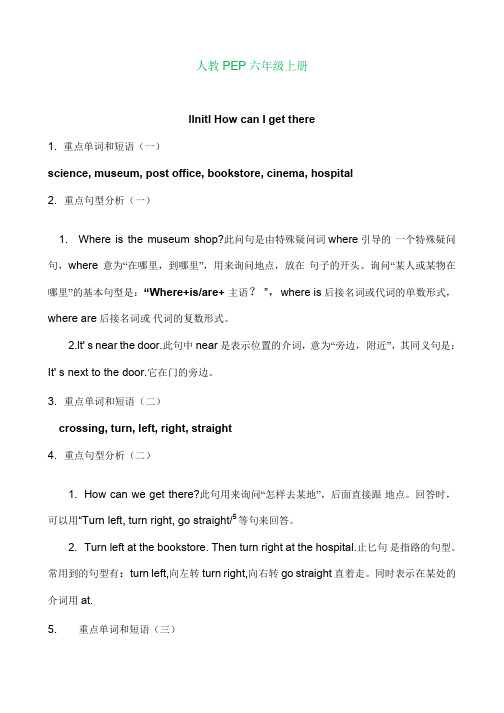
人教PEP六年级上册llnitl How can I get there1. 重点单词和短语(一)science, museum, post office, bookstore, cinema, hospital2. 重点句型分析(一)1. Where is the museum shop?此问句是由特殊疑问词where引导的一个特殊疑问句,where意为“在哪里,到哪里”,用来询问地点,放在句子的开头。
询问“某人或某物在哪里”的基本句型是:“Where+is/are+ 主语?”,where is后接名词或代词的单数形式,where are后接名词或代词的复数形式。
2.lt' s near the door.此句中near是表示位置的介词,意为“旁边,附近”,其同义句是:It' s next to the door.它在门的旁边。
3. 重点单词和短语(二)crossing, turn, left, right, straight4. 重点句型分析(二)1. How can we get there?此句用来询问“怎样去某地”,后面直接跟地点。
回答时,可以用“Turn left, turn right, go straight/5等句来回答。
2. Turn left at the bookstore. Then turn right at the hospital.止匕句是指路的句型。
常用到的句型有:turn left,向左转turn right,向右转go straight直着走。
同时表示在某处的介词用at.5. 重点单词和短语(三)Tasty, buy, London Eye, next to, far from, go straight, turn left, stomach 6. 重点句型分析(三)Is the Thames far from here? No.此句是个be动词开头的一般疑问句,其回答要用yes或no.句中的far from意为“离 ............................................. 远”。
PEP小学英语六年级上下全册知识点总结
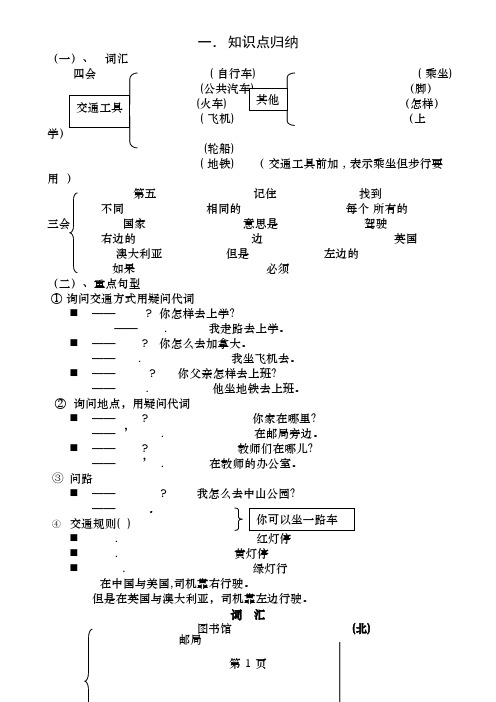
一. 知识点归纳(一)、 词汇乘坐) (脚)火车(怎样) 飞机(上轮船) ( 地铁) ( 交通工具前加 , 表示乘坐但步行要用 )第五 记住 找到不同 相同的 每个 所有的三会 国家 意思是 驾驶右边的 边 英国 澳大利亚 但是 左边的 如果 必须(二)、重点句型① 询问交通方式用疑问代词⏹ —— ? 你怎样去上学?—— . 我走路去上学。
⏹ —— ? 你怎么去加拿大。
—— . 我坐飞机去。
⏹ —— ? 你父亲怎样去上班?—— . 他坐地铁去上班。
② 询问地点,用疑问代词⏹ —— ? 你家在哪里?—— ’ . 在邮局旁边。
⏹ —— ? 教师们在哪儿?—— ’ . 在教师的办公室。
③ 问路⏹ —— ? 我怎么去中山公园?—— .④ 交通规则( )⏹ ⏹ . 黄灯停 ⏹ . 绿灯行在中国与美国,司机靠右行驶。
但是在英国与澳大利亚,司机靠左边行驶。
词 汇图书馆 (北) 邮局医院: 电影院(地点) 书店 (东) (西)科学博物馆银行学校(南)超市鞋店在哪里请与…相邻右边,正确的左边成直线地然后转弯对不起想要双分钟告诉乘坐远放学以后上车下车第十二聚会;晚会开始买句型一、问路. , ? 请问电影院在哪儿?. 在医院的旁边。
. 在学校的前面.在公园的后面’ . 在动物园的附近.. 在书店的左右边.. 在银行的东边.. 离这儿很远.. , 请问这附近有电影院吗?, . 有.. ? 我该怎样到达医院呢?二、指引路. . 你可乘坐路公交车去那儿.. …在…地方上车下车.. . 向前直走在分钟.. …在…地方向右左转.朝东西南北走…分钟.三 ? 离这儿远吗?一.知识点归纳(一)、词汇四会下周报纸今天上午漫画书今天下午杂志(时间 ) 今天晚上字典今夜明信片明天去旅游主题公园买一些水果宠物店(活动)去看电影(其他)水果摊参观长城鞋店阅读有关植物的杂志商店三会:忙碌的一起地需要其他二、重点句式与句型:本单元中出现的一个重点语法项目是一般将来时:表示将要发生的动作或状态,常与表示将来的时间连用。
六年级英语重点知识总结
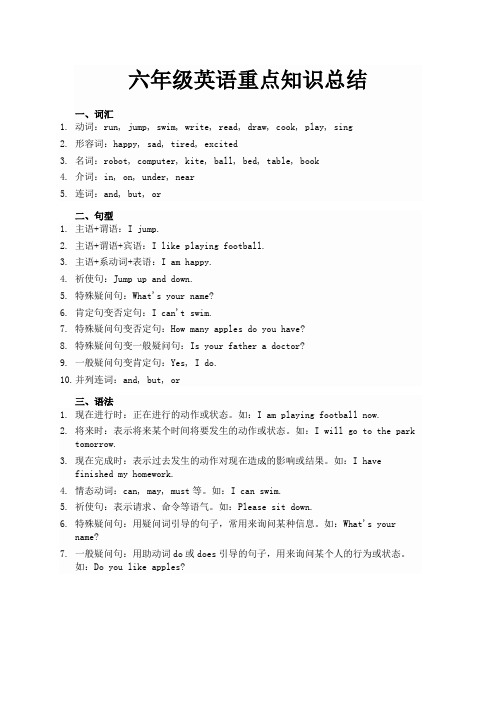
六年级英语重点知识总结一、词汇1.动词:run, jump, swim, write, read, draw, cook, play, sing2.形容词:happy, sad, tired, excited3.名词:robot, computer, kite, ball, bed, table, book4.介词:in, on, under, near5.连词:and, but, or二、句型1.主语+谓语:I jump.2.主语+谓语+宾语:I like playing football.3.主语+系动词+表语:I am happy.4.祈使句:Jump up and down.5.特殊疑问句:What's your name?6.肯定句变否定句:I can't swim.7.特殊疑问句变否定句:How many apples do you have?8.特殊疑问句变一般疑问句:Is your father a doctor?9.一般疑问句变肯定句:Yes, I do.10.并列连词:and, but, or三、语法1.现在进行时:正在进行的动作或状态。
如:I am playing football now.2.将来时:表示将来某个时间将要发生的动作或状态。
如:I will go to the parktomorrow.3.现在完成时:表示过去发生的动作对现在造成的影响或结果。
如:I havefinished my homework.4.情态动词:can, may, must等。
如:I can swim.5.祈使句:表示请求、命令等语气。
如:Please sit down.6.特殊疑问句:用疑问词引导的句子,常用来询问某种信息。
如:What's yourname?7.一般疑问句:用助动词do或does引导的句子,用来询问某个人的行为或状态。
如:Do you like apples?。
人教版小学pep英语(三年级起点)六年级上册知识点归纳

Unit1 How can I get there? 我怎样到达这里?重点单词:where哪里how 怎样can能够near近的ask问tell 告诉far远的science科学 hospital 医院museum 博物馆postoffice 邮局library图书馆bookstore 书店usually通常 sometimes有时候 often 经常know知道 near旁边next to旁边(比near更近)crossing 十字路口turn left 向左转turn right 向右转 go straight直走in front of在…的前面behind在...的后面重点句子:1.How do you go to school? 你是怎样去上学的?2.where is the restaurant? 餐馆在哪里?ually I go to school on foot.我通常走路去上学。
4.Sometimes I go by bike.有时候我骑自行车去。
、5.问路之前,出于礼貌,我们要说“Excuse me.”与后面的句子要用标点符号隔开。
6.Look at the traffic lights, remember the trafficrules.看着交通灯,记住交通规则。
7.Stop at a red light.Wait at a yellow light.Go at agreen light.红灯停。
黄灯等一等。
绿灯行。
8.Red means stop, yellow means wait, green means go.红色的意思是停止,黄色的意思是等待,绿色的意思是通行。
9.How can I get to the park? 我该怎样到达公园呢?10.You can go by the No.15 bus.你可以坐15路公交车去。
重点知识:1.坐某种交通工具用by,例如:by bike, by train。
PEP六年级英语(上册)期末知识点总结

六年级上册英语复习知识点Unit1 HowcanIgetthere?一、主要单词:tasty 美味的LondonEye 伦敦眼stomach 胃gostraight=walkstraight 直走nextto 紧挨着/与⋯相邻farfrom(离⋯远)near 在⋯附近behind(在⋯后面)infrontof (在⋯前面)between⋯and⋯(在⋯和⋯之间)hot(反义词)cold cool( 反义词)warm too (同音词)to/twocannot(缩写)can’t right( 反义词)left/wrong buy( 同音词)by/byesea(同音词)see first (基数词)one four( 序数词)fourthdid( 原形)do/does three( 序数词)third give( 过去式)gave二、重点句型分析1、询问“某人或某物在哪里”的基本句型是:“Where+is/are+ 主语?”,whereis 后接名词或代词的单数形式,whereare 后接名词或代词的复数形式。
表示地点的词:museum博物馆,postoffice 邮局,bookstore 电影院,hospital 医院restaurant 餐馆bank银行busstop湖library图书馆zoo动物园school学校park公园garden馆书店,cinema公交车站lake花园hotel旅2. It’snearthedoor.此句中near是表示位置的介词,意为“旁边,附近”,其同义句是:It’s nexttothedoor. 它在门的旁边。
表示位置的短语:nexttothebookstore挨着书店nearthehospital 在医院附近nearthepostoffice 在邮局附近overthere在那边onDongfangStreet在东方大街上infrontoftheschool在学校前面3.Howcanwegetthere?此句用来询问“怎样去某地”,后面直接跟地点。
人教PEP 六年级英语上册 Unit3 名师划重点

2 have to do 结构:have to 意为“不得不;必须”,后 面接动词原形。 典例 I can't go swimming with you. I have to do my homework. 我不能和你一起去游泳。我得做我的家庭作业。
3 lots of = a lot of 许多,后面接可数名词复数或不可 数名词。 典例 There are lots of beautiful pictures in the book. 这本书里有许多美丽的图画。
点拨:a lot of 后面接可数名词的复数。
5. It's seven o'clock now. My sister ____h_a_s___ (have) to get up.
点拨:主语My sister 为第三人称单数,后面的动词要用 第三人称单数形式,has 是have的第三人称单数形式。
Mike: You too. I have to do my homework now. Bye. 迈克: 你也是。现在我得做我的家庭作业了。再见。 Sarah: OK. Bye. 萨拉:好吧。再见。
Part B Let’s talk John: My cousin Jack is going to visi(t) me next week. 约翰:我的表弟杰克下周打算来看望我。 Amy: That's nice. Where are you going? 埃米:那太好了。你们打算去哪里?
Unit 3 My weekend plan
必背词汇
四会单词
visit 拜访
film 电影
trip 旅行
supermarket 超市 evening 晚上;傍晚
人教版(PEP)小学六年级上册英语知识点【三、四、五单元】

人教版〔PEP〕小学六年级上册英语知识点【三、四、五单元】Unit 3 What are you going to do ?一、重点短语:this morning 今天上午this afternoon 今天下午thisevening 今天晚上next week 下周tomorrow 明天tonight 今晚post card 明信片comic book漫画书newspaper报纸二、重点句型:1.What are you going to do on the weekend?你周末打算做什么?’m going to visit mygrandparents this weekend?这个周末我打算去看望我的外祖父母。
3.Where are you going this afternoon?你今天下午打算去哪里?’m going to thebookstore.我打算去书店。
5.What are you going to buy?你打算去买什么?’去买一本漫画书。
三、重点语法:1、What are you goingto do?你想做什么?询问他人在未来的打算。
be going to 后面要跟动词的原形。
注意be going to be 意思是“打算成为什么,干什么职业。
〞注意一下句子的区别,找出正确答复。
What are you going to do this afternoon?What are you going tobuy?What are you going to be?When? are you going?Where are you going?How areyou going?Who are you going with?2、this evening 和 tonight的区别:this evening指的是今天晚上睡觉以前的时间,一般指晚上十二点以前。
而tonight指的是今晚,一般是指一整晚的时间,通宵。
- 1、下载文档前请自行甄别文档内容的完整性,平台不提供额外的编辑、内容补充、找答案等附加服务。
- 2、"仅部分预览"的文档,不可在线预览部分如存在完整性等问题,可反馈申请退款(可完整预览的文档不适用该条件!)。
- 3、如文档侵犯您的权益,请联系客服反馈,我们会尽快为您处理(人工客服工作时间:9:00-18:30)。
Unit1重点句型
1.---How do you go to school ?你怎样去学校?
---I go to school by bike./I go by bike .我骑自行车去学校。
---Usually I go to school on foot ,Sometimes I go by bike .我通常步行去学校,有时骑自行车去。
---Usually I go to school on foot ,becase my home is near .我通常步行上学,因为我家离的很近。
2.---How can I get to the zoo ?我怎样才能到达公园?
---You can go by subway .你可以乘地铁去。
---You can go by the No.12 bus.你可以乘12路公共汽车去
3.---Where is your home ?你家在哪?---My home is near the post office .我家在邮局附近。
4.Remember the traffic rules :Stop at a red light .Wait at a yellow light .Go at a green light .
记住交通规则:红灯停,黄灯等一等,绿灯行。
5.The traffic lights are the same in every country .在每个国家交通灯是相同的。
6.In China ,drivers drive on the right side of the road .在中国,司机靠路的右边行驶。
Unit2重点句型
1.---Where is the cinema,please?请问电影院在哪?---It’s next to the hospital .它与医院相邻。
2.---How can I get to the post office ?我怎样才能到达邮局?
---Turn left at the cinema,then go straight .It’s on the left .在电影院左拐,然后直着走,它就在左边。
3.---Excuse me ,is there a cinema near here ?打扰了,附近有电影院吗?------Yes ,there is .是的,有。
4.Walk straight for three minutes .直走三分钟。
5.---Can I go by the No.30 bus ?我能坐30路公共汽车去吗?----Yes,I can ./No,I can’t .
Unit 3重点句型
1.---What are you going to do on the weekend ?这个周末你要去做什么?
---I’m going to visit my grandparents this weekend .我打算去看望我的爷爷奶奶。
2.---Where are you going this afternoon ?今天下午你要去哪里?
---I’m going to the bookstore .我将要去书店。
3.---What are you going to buy ?你将要去买什么?
---I’m going to buy a comic book .我将要去买一本漫画书。
4.---When are you going ?你什么时候去?---I’m going at 3 o’clock .我将要在三点去。
5.---What are you going to do in 20 year’s time ?20后你打算做什么?
---I’m going to walk on the moon .我打算在月球上行走。
Unit1重点短语
1.go to school 上学
2.by bike 骑自行车
3.by car 坐小汽车
4.by bus 乘公共汽车
5.by train 乘火车
6.by subway 乘地铁
7.by ship 乘船
8.by plane 乘飞机
9.on foot 步行10.go to the USA去美国11.go to the park 去公园12.traffic light 交通灯13.traffic rule 交通规则14.stop at a red light 红灯停15.wait at a yellow light 黄灯等
16.go at a green light 绿灯行17.every country 每个国家18.in China 在中国
19.on the right 在右边20.on the left 在左边21.get to 到达
Unit2重点短语
1.in the front of 在……前面
2.post office 邮局
3.science museum 科学博物馆
4.next to 与……相邻
5.excuse me 对不起
6.after school 放学以后
7.shoe store鞋店
8.a pair of shoes 一双鞋
9.by the No.301 bus 乘坐301路公共汽车10.get off 下车
11.get on 上车12.walk straight =go straight 直走13.on the left 在左边14.turn left左转15.turn right 右转16.on Saturday 在周六17.look for 寻找
Unit3重点短语
1.next week 下周
2.this morning 今天上午
3.this afternoon 今天下午
4.this evening今天晚上
5.take a trip 去旅行
6.go to the cinema 去看电影
7.shoe store 鞋店
8.visit grandparents 看望外祖父母
9.watch TV 看电视10.on the weekend 在周末11.read a magazine 阅读杂志12.on Saturday 在周六13.go home 回家ic book 漫画书15.post card 明信片
16.Sunday afternoon 周日下午17.plant trees 植树18.plant shop 植物商店19.in 20 year s’ time 20年后20. on the moon 在月球上21.go to the cinema 看电影22.learn kung fu 学功夫23.bake a cake 烘烤蛋糕24.the Great Wall 长城。
